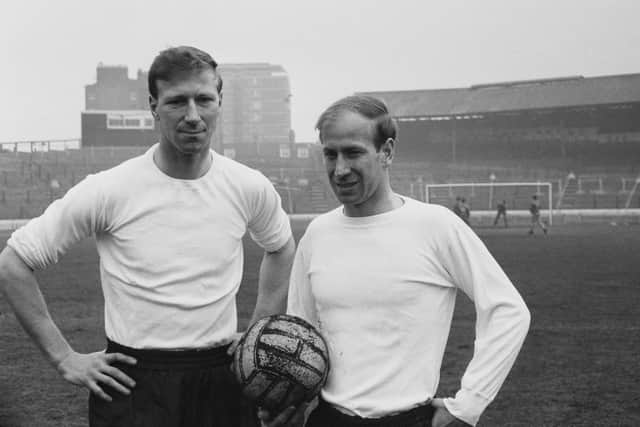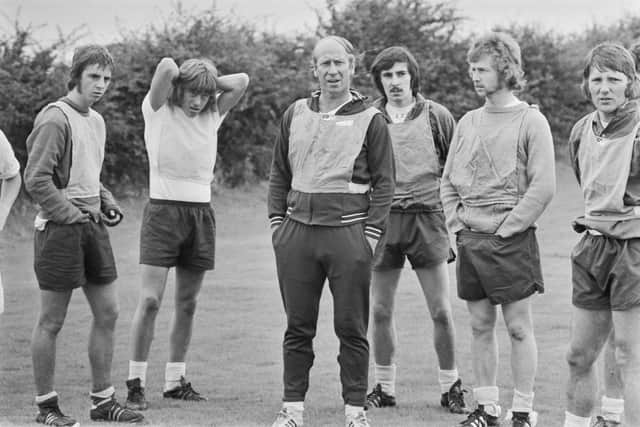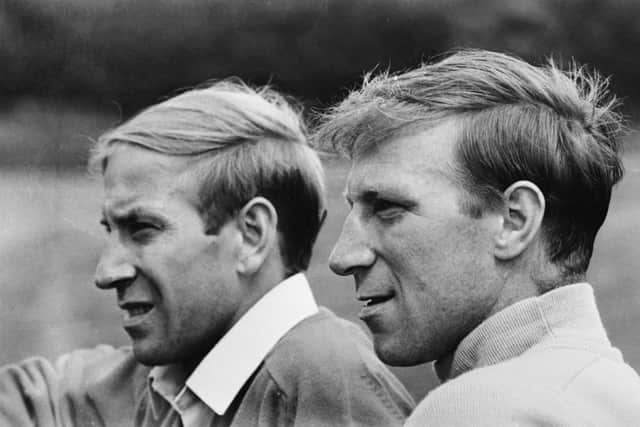When Manchester United legends Bobby and Jack Charlton locked horns as managers for Middlesbrough and Preston North End
The ‘Charlton derby’ took place at Middlesbrough’s former Ayresome Park home on December 11, 1973 in front of 23,930 spectators with Preston North End being the visitors.
The original Division Two fixture between Boro – managed by the elder sibling in Jack – and North End, led by Bobby, had been called off earlier that month after Teesside was left under a blanket of snow.
Advertisement
Hide AdAdvertisement
Hide AdSome remarkable television footage ahead of that first scheduled meeting still exists to this day.


The rearranged game saw Boro prevail comfortably in a season when both Charlton brothers had contrasting fortunes.
Jack, a serial winner in a long and decorated 21-year playing association with Leeds United, was offered the Boro job on his 38th birthday that May.
He declined to be interviewed for the position and instead handed the club a list of responsibilities he expected to take, which if agreed to would give him total control of the running of the club.
Advertisement
Hide AdAdvertisement
Hide AdOne of which was allowing him requisite time off for him to follow his beloved pursuits of shooting and fishing.


The board adhered to his request and the incomparable, bluff Northumbrian soon got to work – and how.
He also took a few leaves out of the book of his football mentor at Elland Road in the shape of Middlesbrough-born Don Revie.
In his time at Leeds, Revie famously replaced the club’s traditional blue and old gold strip to an all-white outfit, inspired by the all-conquering Real Madrid side of the 1950s.
Advertisement
Hide AdAdvertisement
Hide AdBoro did not switch from red to white, but Charlton did introduce a white band on the club’s red jerseys, which has since become iconic.


He said that the decision was down to logic and practicality to enable players to identify each other better on the pitch and nothing else. Typical Jack.
The kit change certainly brought about a transformation in fortunes at Boro, who had been outside of the top flight of English football since 1954.
In terms of players at his disposal, Charlton had quickly realised upon arrival that he had plenty to work with.
Advertisement
Hide AdAdvertisement
Hide AdThey included two fine young English players in David Armstrong and David Mills, alongside an abrasive Scot who was put on the straight and narrow by Charlton and went onto become one of the most feted midfielders of his generation in Graeme Souness.
Charlton had a sturdy goalkeeper in Jim Platt and silk in central defence in Willie Maddren, whose style complimented the steel of captain Stuart Boam, with the uncompromising John Craggs and indefatigable Frank Spraggon operating as full-backs.
Further forward, he had an able target man and reliable goalscorer in John Hickton and a willing runner in former cross-country champion Alan Foggon, whose ability to run from deep and spring offside traps became a hallmark of Charlton’s Boro – and a tactical nuance which other teams would try and follow.
The one signing that Charlton did make was a huge one.
He sought the counsel of Jock Stein and the wheels were put in motion for Boro to land a ‘Lisbon Lion’ in Bobby Murdoch, whose prodigious ball-playing ability provided the class that every successful side requires.
Advertisement
Hide AdAdvertisement
Hide AdAfter an opening-day win at Portsmouth, Boro lost 2-0 at home to Fulham in Charlton’s first match in charge on September 1.
They would not lose another league game in five months until February 2, with the unbeaten sequence spanning a colossal 24 games. Charlton’s side had gone top in late September and the title race would become a procession.
For Bobby, it was much more difficult.
For North End, it was a season of struggle. Their battle to retain their second-tier tenure was made tougher by being docked a point after playing an ineligible player in striker Dave Carrick, who came on as a substitute in a game against Oxford United in November 1973.
He had signed from non-league Witton Albion the previous week, but his registration with the Football League had not come through.
Advertisement
Hide AdAdvertisement
Hide AdPreston, who included a World Cup winner and former Boro player in their ranks in Nobby Stiles, were in 13th place and had won just one of their previous eight matches before arriving at Ayresome. Boro were running hot and the outcome was not unexpected.
Boro went 2-0 up early on through Mills and Murdoch before Souness scored his first goal for the club.
While Preston continued to toil that winter, Boro went from strength to strength in a season when they broke all sorts of records and ended the campaign on 65 points, a record total in the days of two points for a win.
They broke the record on the final day of the season at Deepdale in front of a crowd of 16,177, which included thousands of travelling supporters.
Advertisement
Hide AdAdvertisement
Hide AdPromoted at the end of March and crowned champions, Boro had a milestone in their sights in Lancashire on a day of contrasting emotions.
Preston had needed a mathematical miracle to avoid the drop against all-conquering Boro side.
Like in the reverse fixture, Boro made a breakneck start, racing into a 3-0 lead en route to a 4-2 success which saw Peter Brine (2), Foggon and Hickton find the net.
Doncaster-born Mike Elwiss, a £70,000 club record signing from his hometown club in February 1974, netted twice for doomed North End.
Comment Guidelines
National World encourages reader discussion on our stories. User feedback, insights and back-and-forth exchanges add a rich layer of context to reporting. Please review our Community Guidelines before commenting.